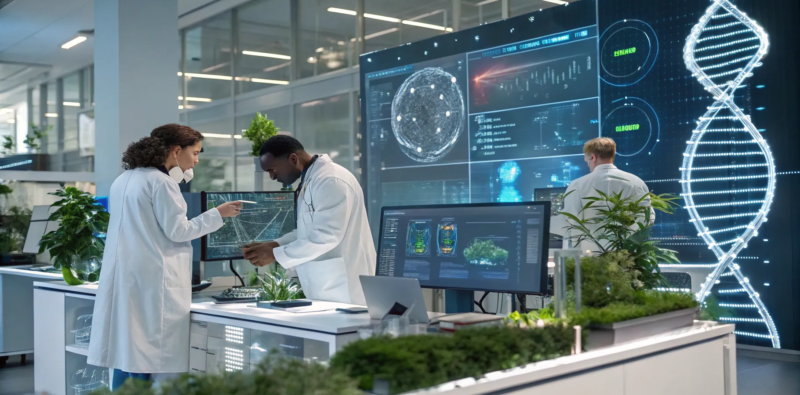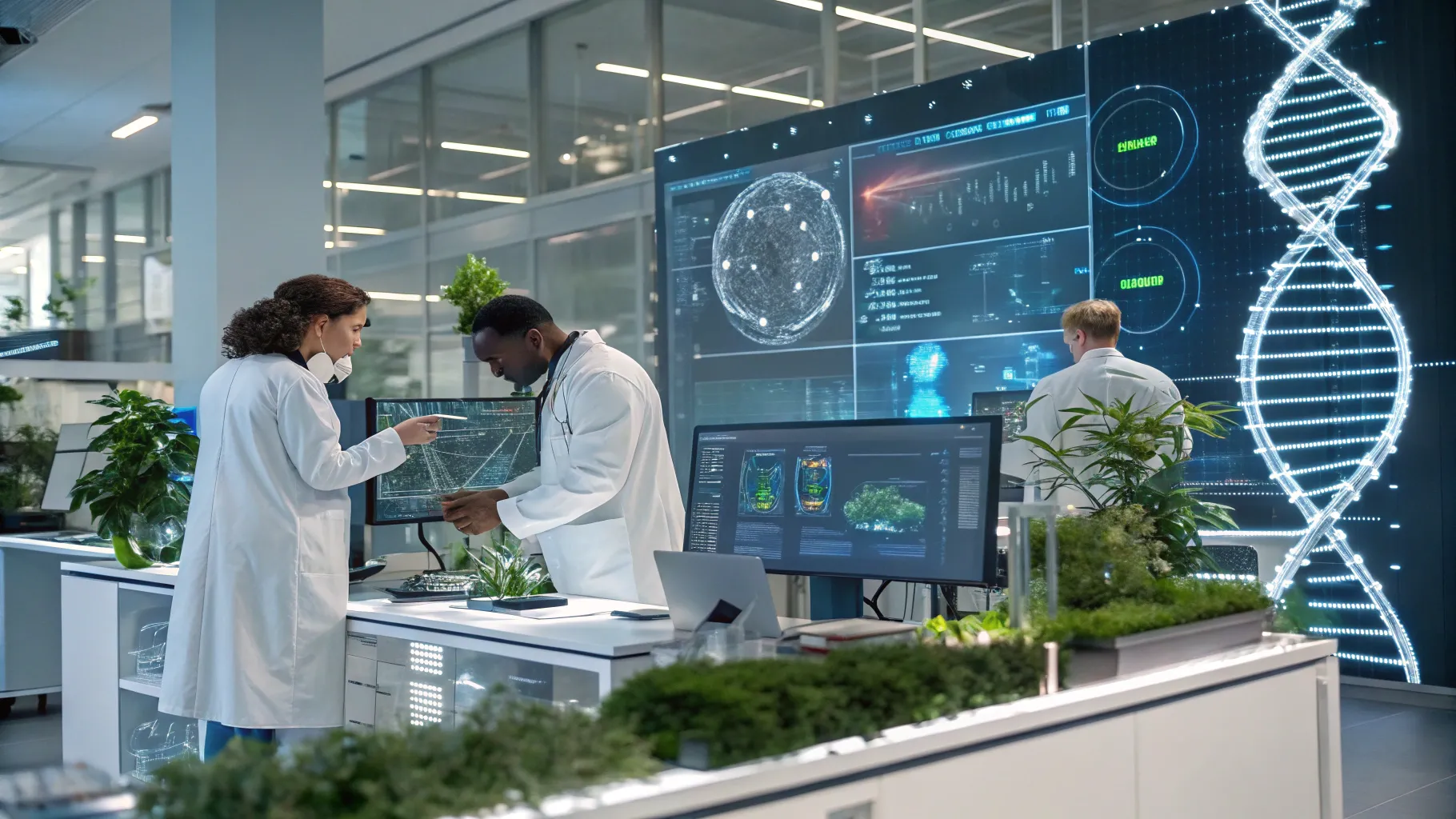
Embracing the Biotech Revolution: How Computing Power is Transforming Careers in Biological Research

In an age where computing power is transforming the biotech landscape, understanding how to harness these advancements can set you apart in your career. This blog explores the intersection of technology and biology, highlighting key career opportunities and the skills needed to thrive in this evolving field.
Table of Contents
- 🚀 The Era of Unlimited Computing Power
- 💻 Why Learning Coding is Essential
- 🏎️ Bioinformatics: The Racing Car of Biological Research
- 💊 The Boom in Drug Discovery and Development
- 🔬 Systems Biology and Synthetic Biology Innovations
- 🧬 Precision Medicine and Oncology Research
- 🤖 The Role of Automation in Modern Labs
- 🌌 The Future of Quantum Biology and AI
- 📈 Choosing Your Path: Old vs New Job Markets
- ❓ Frequently Asked Questions
🚀 The Era of Unlimited Computing Power
We are living in an extraordinary time where computing power is no longer a luxury; it is a necessity. In the past, computers were bulky machines that could barely process a fraction of the data we handle today. Now, we carry more powerful devices in our pockets than what was used to send astronauts to the Moon! This shift has opened up a world of possibilities, especially in the field of biological research.
With advancements in technology, researchers can now analyze massive datasets generated from various biological experiments. This capability is crucial because biological research often involves complex data that needs to be interpreted accurately. For students interested in this field, understanding how to leverage this computing power will be essential for future success.
Imagine being able to process genomic data or analyze protein structures in a fraction of the time it used to take. This is the reality we are stepping into, and it’s vital for aspiring professionals to be equipped with the necessary skills to thrive in this environment.
Key Technologies Driving Change
- Artificial Intelligence (AI): AI algorithms can predict outcomes, automate processes, and offer insights that were previously unimaginable.
- Machine Learning (ML): ML allows computers to learn from data, making it easier to identify patterns and make predictions.
- Big Data Analytics: This technology enables the processing of vast amounts of information, which is crucial for research and development.
💻 Why Learning Coding is Essential
In today’s job market, coding is becoming as fundamental as reading and writing. As a student, if you want to stand out in the field of biological research, knowing how to code will give you a significant advantage. Programming skills are not just for computer scientists; they are essential for biologists, chemists, and researchers alike.
Learning programming languages like R, Python, or Java can help you manipulate data, automate repetitive tasks, and develop analytical models. These skills are increasingly being sought after by employers who are looking for candidates who can bridge the gap between biology and technology.
Furthermore, coding can help you understand the algorithms that power many of the tools used in biological research. This knowledge will enable you to optimize experiments and interpret data more effectively.
How to Get Started with Coding
- Online Courses: Platforms like Coursera and edX offer courses tailored for beginners.
- Join Coding Bootcamps: These intensive programs can help you learn coding in a short period.
- Practice Regularly: Apply what you learn through projects or contribute to open-source initiatives.
🏎️ Bioinformatics: The Racing Car of Biological Research
Bioinformatics is revolutionizing biological research by combining biology, computer science, and information technology. It is often described as the “racing car” of research because it speeds up the process of data analysis and interpretation.
With bioinformatics, researchers can analyze genomic sequences, predict protein structures, and study evolutionary relationships much faster than traditional methods. This field is essential for anyone interested in cutting-edge research in genetics, molecular biology, and pharmaceuticals.
As a student, diving into bioinformatics can open doors to various career paths, including drug development, clinical research, and personalized medicine.
Applications of Bioinformatics
- Genomic Sequencing: Understanding the genetic makeup of organisms.
- Protein Structure Prediction: Predicting how proteins fold and function.
- Phylodynamics: Studying the evolution of species through genetic data.
💊 The Boom in Drug Discovery and Development
The pharmaceutical industry is experiencing transformative changes thanks to advancements in technology. Artificial intelligence and machine learning are now integral to drug discovery and development processes. These technologies allow researchers to analyze vast amounts of data, identify potential drug candidates, and predict their efficacy and safety.
As a result, the time and cost associated with bringing new drugs to market are significantly reduced. For students considering a career in this field, understanding how these technologies work will be invaluable.
Moreover, as more drugs enter clinical trials, the demand for professionals skilled in drug development will only increase. This area is ripe for growth, making it an attractive option for aspiring researchers.
Future Trends in Drug Discovery
- AI-Driven Drug Design: Utilizing AI to design new compounds based on existing data.
- Personalized Medicine: Tailoring drug treatments based on individual genetic profiles.
- In Silico Trials: Using computer simulations to predict drug behavior before actual trials.
🔬 Systems Biology and Synthetic Biology Innovations
Systems biology and synthetic biology are at the forefront of modern biological research. These fields focus on understanding complex biological systems and engineering new biological parts for specific applications. With the help of computational models, researchers can simulate entire biological pathways, allowing for a better understanding of diseases and potential treatments.
In synthetic biology, scientists can design organisms to produce biofuels, detect diseases, or even create new materials. This innovative approach has the potential to solve some of the world’s most pressing challenges, such as energy production and healthcare.
For students, pursuing a career in these areas can lead to exciting opportunities in research, industry, and academia.
Emerging Technologies in Systems Biology
- Computational Modeling: Creating models to simulate biological processes.
- Gene Editing Technologies: Using CRISPR and other tools to modify genetic material.
- Data Integration: Combining data from various biological sources for comprehensive analysis.
🧬 Precision Medicine and Oncology Research
Precision medicine is a groundbreaking approach in healthcare that tailors treatment based on individual characteristics, including genetics, environment, and lifestyle. In oncology research, this means developing targeted therapies that are more effective and have fewer side effects for cancer patients.
Advancements in computing power and big data analytics play a crucial role in this transformation. By analyzing vast amounts of genomic data, researchers can identify mutations and other biomarkers that are unique to each patient’s cancer. This information allows for the design of personalized treatment plans that significantly improve outcomes.
For students interested in oncology, understanding how to leverage data analytics and bioinformatics tools is essential. This field is not only growing rapidly but also offers numerous career opportunities, from research and clinical trials to data analysis and patient care.
Key Components of Precision Medicine
- Genomic Sequencing: Identifying genetic mutations that drive cancer.
- Biomarker Discovery: Finding unique biological markers that predict treatment responses.
- Data Integration: Combining patient data from various sources to inform treatment decisions.
🤖 The Role of Automation in Modern Labs
Automation is revolutionizing laboratories across the globe, enhancing efficiency and accuracy in research. Robots and automated systems are increasingly handling repetitive tasks, such as sample preparation and data collection, allowing researchers to focus on more complex analyses.
This shift not only speeds up the research process but also reduces the risk of human error. As a result, laboratories can achieve higher reproducibility of results, which is critical in scientific research.
For students, gaining skills in automation technologies can set you apart in the job market. Familiarity with automated systems and robotics will make you a valuable asset to any research team.
Benefits of Automation in Labs
- Increased Efficiency: Automated systems can perform tasks faster than humans.
- Enhanced Accuracy: Reduces the likelihood of errors in data collection.
- Cost-Effectiveness: Saves time and resources in the long run.
🌌 The Future of Quantum Biology and AI
Quantum biology is an emerging field that combines quantum physics with biological systems. This innovative approach has the potential to unlock new understandings of complex biological processes, such as photosynthesis and enzyme reactions.
Artificial intelligence (AI) is also making waves in this arena. By applying machine learning algorithms, researchers can analyze quantum data more effectively, leading to breakthroughs in areas like drug design and disease modeling.
For students, exploring quantum biology and AI offers exciting possibilities. As these fields grow, there will be a high demand for professionals who can navigate the complexities of both biology and quantum physics.
Trends in Quantum Biology
- Enhanced Drug Development: Using quantum computing to model drug interactions at the molecular level.
- Biological Process Simulation: Simulating complex biological systems to predict outcomes.
- AI Integration: Employing AI to analyze quantum data for deeper insights.
📈 Choosing Your Path: Old vs New Job Markets
The job market is evolving rapidly, especially in the life sciences and biotechnology sectors. Traditional roles that focused solely on wet lab techniques are declining, while positions requiring a blend of biology, computing, and data analysis are on the rise.
Students must adapt to this shift by acquiring new skills. Learning programming, bioinformatics, and automation techniques will not only enhance your employability but also prepare you for the future job market.
It’s essential to stay informed about industry trends and be willing to embrace change. By doing so, you can carve out a successful career in this exciting and dynamic field.
Actionable Steps for Students
- Research Current Trends: Stay updated with the latest advancements in biotechnology.
- Upskill: Take courses in bioinformatics, data analysis, and automation.
- Network: Connect with professionals in the industry to gain insights and opportunities.
❓ Frequently Asked Questions
As students explore their career options in biotechnology, they often have questions. Here are some common inquiries and their answers:
What qualifications do I need for a career in biotechnology?
A degree in life sciences, biotechnology, or a related field is typically required. Additionally, skills in programming and data analysis are increasingly important.
Is coding necessary for a career in biotech?
Yes, coding skills can significantly enhance your employability in biotech. Familiarity with programming languages like Python or R is highly beneficial.
What are the emerging job roles in the biotech industry?
Emerging roles include data analysts, bioinformatics specialists, clinical data managers, and automation engineers, among others.
How can I stay relevant in the changing job market?
Continuously update your skills through online courses, workshops, and internships. Networking and staying informed about industry trends will also help you remain competitive.
